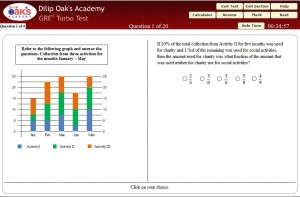
The GRE test, conducted by ETS, is one of the world’s most widely used tests for admission to universities both in America and worldwide. On 1 August 2011, the ETS introduced the Revised GRE test. This exam lasts for about 4 hours and consists of 3 major of section types:
The Structure of the Revised General GRE
|
Section Type |
No. of Sections |
No. of Questions per Section |
Time Allotted |
Order in Exam |
Score Scale |
|
Analytical Writing |
1 |
2 essay topics |
30 min per essay; 1 hour totally |
Always first |
0 – 6 |
|
Verbal Reasoning |
2 |
20 |
30 min per section; 1 hour totally |
Not fixed; randomly decided |
130 – 170 |
|
Quantitative Reasoning |
2 |
20 |
35 min per section; 1 hour totally |
Not fixed; randomly decided |
130 – 170 |
Unscored and Research Sections
In addition to the regular sections there may also be a 30 or 35-minute ‘Unscored’ section, which may come at any point after the Analytical Writing Section. Sometimes in place of the Unscored section there may be a 30 or 35-minute ‘Research’ section, which always comes at the end of the test. Both the Unscored and Research sections usually consist of an extra Quantitative or Verbal Reasoning section.
The ETS uses the Research section for testing new kinds of questions. The Unscored section is also used to make sure that the level of difficulty and the scoring in different editions of the test and in individual tests is the same. Neither the Unscored or Research sections contributes to a test-taker’s actual score.
If an unscored section appears in the test, there is usually no way of identifying which section is unscored – all that the test-taker will know is that there are 3 Verbal or 3 Quantitative sections instead of 2. So, all sections have to be attempted equally seriously. The Research section however, always comes at the end and therefore can be easily identified and skipped.
There will be a break of 10 minutes after the second section and breaks of 1 minute between the other sections, bringing the total testing time to about 4 hours.
The Section-Level Adaptive Format
The revised general GRE has a section-level adaptive format in the Verbal and Quantitative Reasoning sections (but not in the Analytical Writing section which has only one topic in the Issue Task and one topic in the Argument Task). This means, that the computer selects questions for the second Verbal or Quantitative section according to your performance in the first section of that type. So, if you have done well in the first section of a particular type, in the next section of the type you will get a greater number of hard questions which will allow you to score more since your score depends on both the number of questions you get right and their difficulty level.
In this format of the exam you can:
- see all the questions in a section once you have entered a section
- choose which questions you want to solve first and which ones you want to solve last and
- go back, review and change your answers
A more detailed discussion of the various sections and question-types follows in later blogs, which you will be able to read soon on this site.
Verbal Reasoning and Quantitative Reasoning Score Scales
The scores for both the Verbal Reasoning and Quantitative Reasoning sections are on a scale of 130-170 with 1-point increments. Your scores in these sections depend on your performance on the questions given and on the number of questions answered in the time allotted. Within each section, all questions contribute equally to the final score.
Information on the score scale for Analytical writing will be given in our soon-to-come blog on Analytical Writing .
But if you really want to know what the Revised General GRE test is like, try out our free full-length online GRE Tests. Also sign up for our 15-day trial for loads of top-notch practice!
GRE Overview:
- Challenges in the Verbal Section of the Revised GRE
- Reading Comprehension and Sentence Completion Questions: Tips
- Quantitative Reasoning Question Type Overview
- Analytical Writing Overview
- Analytical Writing: Why 6 & 8 Are Important Numbers in this Section
GRE Practical Details:
- Registering for, Rescheduling and Cancelling Your GRE Test
- Getting Additional GRE Score Reports
- Selecting Which Scores the ETS Should Send to Universities

The Subject GRE test is held only once in India, generally on the second Saturday of November. You should register for the test preferably by August. You can get the subjects and the syllabus here: http://www.ets.org/gre/subject/about
when you register for the test you will get sample questions from ETS free of charge. You can also check for related books on http://www.amazon.com